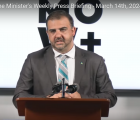Nassau, The Bahamas — Trade Union leaders have made an impassioned plea for constitutional provisions preventing Parliament from infringing on workers rights of association.
Jennifer Isaacs-Dotson, president of the National Congress of Trade Unions and Obie Ferguson, president of the Bahamas Trade Union Congress appeared before the Constitution Reform Commission on Friday.
Religious leaders, a representative from the College of the Bahamas Union of Students, and former Parliamentary Commissioner Errol Bethel are slated to appear before the Commission this week.
Rev. Dr. Myles Munroe, Rev. Lyle Bethel and Rev. Dr. Simeon Hall will make presentations on Thursday, and Mr. Bethel and a representative of the students’ union on Friday.
A religious symposium will be held on February 1 during which leaders of religious denominations will make their case to the Commission.
Mrs. Isaacs-Dotson noted that the right to join and associate with the trade union of one’s choice is enshrined in the Constitution.
However, the Industrial Relations Act mandates that independent trade unions must seek written authorisation of the Minister of Labour before they can become affiliated or associated with any internationally constituted or organised union or agency, she explained.
Additionally, the Industrial Relations Act mandates that independent trade unions in The Bahamas can organise only within their specific craft, she said.
“This provision is not only in violation of the Constitution of The Bahamas,” said Mrs Isaacs-Dotson, “but is also in breach of ILO Convention 87 ‘Freedom of Association and Protection of the Right to Organise Convention.
“(We) recommend that the Constitution be amended to ensure that Parliament is restricted from enacting any such legislation to prevent freedom of association.”
TUC president Obie Ferguson who endorsed Mrs Isaacs-Dotson’s presentation, criticised even the Government for challenging workers decisions to join the unions of their choice.
“Imagine you have to go away to prove your right to join a union,” he said. “We have to go all the way to the Privy Council to determine whether or not we can join a union.”
Among other recommendations, the unions called for the removal of all forms of discrimination between Bahamian men and women including provisions associated with the right of spouses to work.
“The Constitution should provide that non-national spouses of Bahamian citizens should be treated equally,” said Mrs Isaacs-Dotson. “Such persons, upon marriage, should have a right to reside and work in The Bahamas and own property jointly.
“Upon application, they should have the right to become a Bahamian citizen five years after marriage, subject to such exceptions or qualifications as may be prescribed in the interests of national security or public policy.”
The unions also want the constitutional provision which provides automatic Bahamian citizenship for children born outside The Bahamas to married Bahamian men, be provided for children born outside The Bahamas to married Bahamian women regardless of spouses’ nationality.
The unions want all forms of discrimination based on sex or gender be eliminated in the Constitution, and marriage defined as “a union between a man and a woman”.
Concerning the Public Service Commission, the unions were of the view that the present structure, tenure and established procedures were “grossly inadequate and do not meet the changing environment of the Public Service.”
They recommended that the Constitution be amended to create a full-time Public Service Commission, with commissioners who have security of tenure or fixed-term contracts and adequate staffing to meet the challenges of addressing public sector reform.
The unions want a limit on the Prime Minister’s powers and want civil society consulted before executive power is exercised.
The unions called for “a truly independent electoral and boundaries commission” to supervise Bahamian elections with reference to boundaries, election donations, election dates and unnumbered or identifiable ballots.
An Integrity Commission should be established to be a watchdog over the affairs of politicians and senior civil servants, stated the unions.
The unions want to ensure that the elected Prime Minister is restricted to two consecutive terms, that there be a system of recall of delinquent representatives, and that there be a fixed date for general elections every five years.
The unions also called for greater local government autonomy.
The unions recommended that the retirement age of judges be increased by five years to 70 years.
“In most progressive countries there is no longer a retirement age at all for the citizens,” stated Mrs Isaacs-Dotson. “We must be cognisant that with the many technological advances in medicine citizens will live longer. Therefore we should consider not having a retirement age imposed upon the citizenry.”





